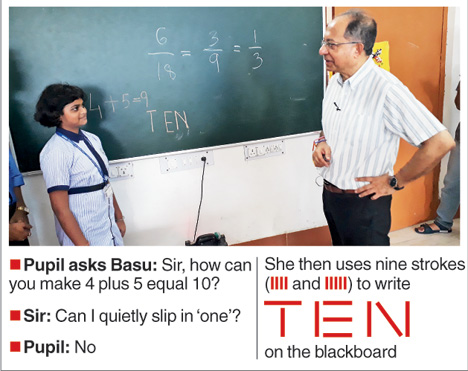
Para (Purulia): "Sir, what, according to you, is integrity?"
"Sir, is it always good to be honest?"
"Sir" tried his best to satisfy the children. Then he told them: "I love numbers."
The ethics posers immediately took a back seat, and it was riddle time.
"Sir, how can you make 4 plus 5 equal 10?" asked a pupil.
"Sir" asked, "Can I quietly slip in 'one'?" The child said "No" before writing "TEN" on the blackboard with nine straight lines.
As riddles flew in thick and fast - with a couple of rounds of noughts and crosses thrown in - a little boy walked up to the blackboard and wrote: "If 4+1=5, 5+2=12, 6+3=21, then solve this, 7+4=?"









On Sunday, it was a different day out for Kaushik Basu, C. Marks Professor of international studies and professor of economics at Cornell University, at a school in Purulia in one of Bengal's remotest corners.
The former World Bank chief economist, who also served as the chief economic adviser to the Indian government, was involved in an impromptu Q&A session with children at the Filix School of Education in Barandanga, Purulia.
"It's very nice to see children here learning with joy. The effect of good education is visible," Basu said as he went from one class to another to interact with more pupils.
Basu, who often fondly remembers the tough questioning by journalists during his days in North Block, faced some easy ones this time: he was asked what his favourite food and favourite sport were. Then came the riddles.
He himself posed the children a few tests. During geography lessons in a classroom, he pointed to the world map hanging from a board and asked: "Which would take longer: travelling from here to here (marking out two points at the top) or from here to here (two points of the same apparent distance along the equator)?"
The students looked silently at one another before Basu explained that the travel time between the two points around the equator would be longer as the earth is round. He then headed for the next classroom.
The school - run by Nanritam, a social welfare organisation - teaches up to Class VI and has 448 pupils, most of whom come from remote villages. The school bears all their expenses, including books, uniforms and transport.
Nanritam also runs a super-speciality eye care unit that caters to over 200,000 patients every year, carrying out 10,000-plus operations, more than 90 per cent of them free of charge. The agriculture wing of Nanritam tries to give farmers better livelihood options.
Basu has been associated with the organisation since 2010-11, said Ranjana Sengupta, Nanritam secretary. "He is our chief mentor and takes special interest in our education initiative."
Education is crucial for Para block, which has a 58.1 per cent literacy rate. The rugged, unfriendly terrain limits the scope for agriculture, and employment is scarce.
Some 25 per cent of the block's working population are farmers and another 39.52 per cent are farm labourers. About 3.83 per cent are in household industry, such as handicrafts. Thirty-five per cent people live below the poverty line.
But Saimyajit Rajwar and Sukhdev Mahato, Class V students at Filix School, represent hope. Both boys, first-generation school-goers like many in their class, conversed in clear English and radiated a self-confidence that surprised Basu.
"My parents say we are lucky to have a school like this in our area. They want me to study hard," said Sukhdev, son of a grocery store employee.
Saimyajit said his school education had helped his mother too: she had begun trying to speak to him in English. "Earlier, she wouldn't understand; now she has started trying," he grinned.
The boys were getting restless to return to the robotics lab at the school, which Basu inaugurated on Sunday. A short while earlier, the boys were learning about the human digestive system and the lifecycle of the butterfly in the 3-D studio room, which district magistrate Alokesh Prasad Roy had thrown open, with Basu in attendance.
"It's encouraging that students are getting such facilities. Although only a small fraction here is getting the benefit of quality education, it will have a cascading effect on society," Basu said, drawing parallels with Bangladesh where spread of education, especially among women, has facilitated development.
As for the last puzzle, it has to be cracked thus:
4+1=5=4x1+1; 5+2=12=5x2+2; 6+3=21=6x3+3.
So, 7+4=7x4+4=32.










